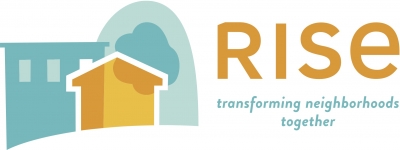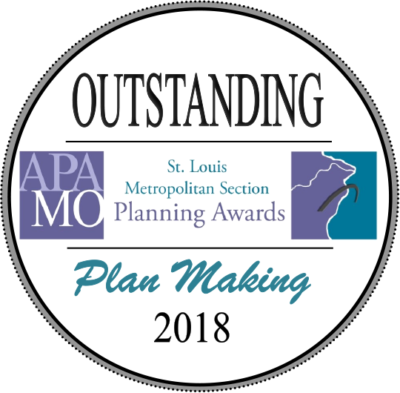Rise offers comprehensive community planning services to nonprofits, foundations, companies, and governments in the St. Louis region. Community plans lay the groundwork for building stronger, more equitable neighborhoods. These plans are public documents which contain specific proposals for programs, policies, future land uses and public improvements in a given community. Plans developed by Rise span housing development, public health, education, employment opportunity, safety, and more. Rise’s division for community planning brings a comprehensive approach to community development in St. Louis-area neighborhoods and municipalities.
Based off engagement with local residents and community leaders, community plans provide policies and a long-range development guide for governments, organizations, and citizens engaged in community development. As a community development organization, Rise is uniquely situated to lead community planning efforts because (1) we bring a realistic and actionable lens to drafting plans, (2) we have pioneered a new approach to planning through intensive community engagement and the application of a racial equity lens, (3) our plans cover topics important to residents and not just those topics found in traditional plans and (4) we, as an organization, have the capacity to implement plan recommendations.
In 2018, Rise received the “Outstanding Plan Making” award from the St. Louis Metro Section of the American Planning Association for their work on the Gravois-Jefferson Historic Neighborhoods Plan.
Read more about the Gravois-Jefferson Plan at gravoisjeffersonplanning.org.
The Rise Difference
Our experienced team of planners and policy makers takes a different approach to planning. Click an option below to learn how Rise applies various principles and approaches to making your plan a true reflection of the needs for the future of your community.
Local Partnerships
Rise’s approach to community planning leverages local partnerships for increased impact and long-term success. We partner with a variety of entities in order to conduct robust community engagement, develop detailed drawings and renderings, and analyze market conditions. For example, in the Gravois-Jefferson Historic Neighborhoods planning process, Dutchtown South Community Corporation led community outreach efforts, UrbanWerks provided architecture and design services, and Development Strategies produced a market study. We also partner with area residents through a resident steering committee, which oversees the work of the planning team and ensures the effort is moving in the right direction. By working with local partners on community plans, we increase communication among partners, break down silos, build support for strategies, and spark implementation.
Robust Community Engagement

Robust and representative community engagement is integral to Rise’s planning work. We strive to engage individuals traditionally underrepresented in community planning efforts: youth, people of color, and individuals experiencing poverty. Only with the contributions of these individuals can community plans be effective tools for equitable community development.
Our team is experienced in a variety of engagement strategies that gather community input and foster connections among residents. We are experts in facilitating large public meetings, stakeholder interviews, multilingual focus groups, youth engagement activities, steering committee meetings, and grassroots canvassing. By partnering with local groups, we expand our community engagement capacity.
Focus on Equity
Rise applies an equity lens to the process and product of our community planning work. We do this by:
- Disaggregating data collected in the existing conditions phase by race and other identities in order to understand inequity in the planning area (for example, study disparities in homeownership rates for white people and black people).
- Tracking demographic information (including race, age, socioeconomic status, and more) for all
individuals engaged. This allows our team to disaggregate the data and community input collected
through the planning process by factors like race and income to see how different identities experience their
community, and how the future vision of one’s neighborhood may vary based on the identities they
hold. - Emphasizing equity as a key community and plan value in conversations with residents,
potential partners, and others involved in this process. - Prioritizing plan recommendations that work toward “a state in which outcomes can no longer be
predicted by identity.”
Addressing Community Needs

Unlike many plans which primarily focus on physical development, Rise produces comprehensive community plans that address the broader needs of communities: safety; youth and education; employment and business development; housing; health; transit, streets and walkability; arts and culture; environment; and more. Rise is uniquely situated to develop plans with this comprehensive scope: our staff has expertise in planning, real estate development, social work, youth programming, innovative finance, economic development, transportation planning, and more. Additionally, in our planning efforts, we engage a national network of cross-sector practitioners to develop appropriate strategies for effective, equitable community development.
Plan Implementation
The value of community plans can be measured by the extent to which they are implemented. Unlike traditional planning firms, Rise, as a community development corporation, has the capacity to implement plans. In implementing past plans, Rise has brought together a variety of public, private and nonprofit entities to collaborate on the issues deemed priorities by residents. For example, Rise partnered with a regional youth jobs organization and a local youth services provider to pilot a Young Neighborhood Leaders program that educates, engages and employs low-income youth in the community development sector. This program is just one example of the ways in which robust community planning efforts led by Rise result in positive outcomes for St. Louis-area neighborhoods.
The way Rise approaches planning is designed to prompt implementation: recommendations include a range of choices at different levels of feasibility, ranging from relatively inexpensive to implement policies to expensive, transformative ones. There are also recommendations that go beyond the scope of the physical neighborhood, so that policy makers have a document based on resident input that they can look to when crafting legislation. Finally, in order to set realistic expectations around implementation, plans include “implementation grids” which detail an estimated length of time and cost for each recommendation. Recommendations are also accompanied by a list of potential funding sources and a list of potential resources.
Ongoing Planning Efforts
West Florissant Capacity Building Initiative
Completed Plans
Wintanley Neighborhood Comprehensive Plan (2021) / Project Lead
City of Ferguson Comprehensive Plan (2020) / Community Engagement and Equity Lead
City of St. Louis Consolidated Plan for 2020 – 2024 / Consultant
St. Clair County Consolidated Plan for 2020 – 2024 / Consultant
Gravois-Jefferson Historic Neighborhoods Plan (2016-18) / Project Lead
Wellston Choice Neighborhood Plan (2013-15) / Housing Lead
Parkview Gardens Neighborhood Sustainable Development Plan (2011-14) / Project Partner
City of St. Louis Consolidated Plan for 2015-2019 (2014) / Consultant
St. Clair County Consolidated Plan for 2015-2019 (2014) / Consultant
City of St. Louis Consolidated Plan for 2010-2014 (2009) / Consultant
St. Clair County Consolidated Plan for 2010-2014 (2009) / Consultant
City of St. Louis Consolidated Plan for 2005-2009 (2004) / Consultant
St. Clair County Consolidated Plan for 2005-2009 (2004) / Consultant

